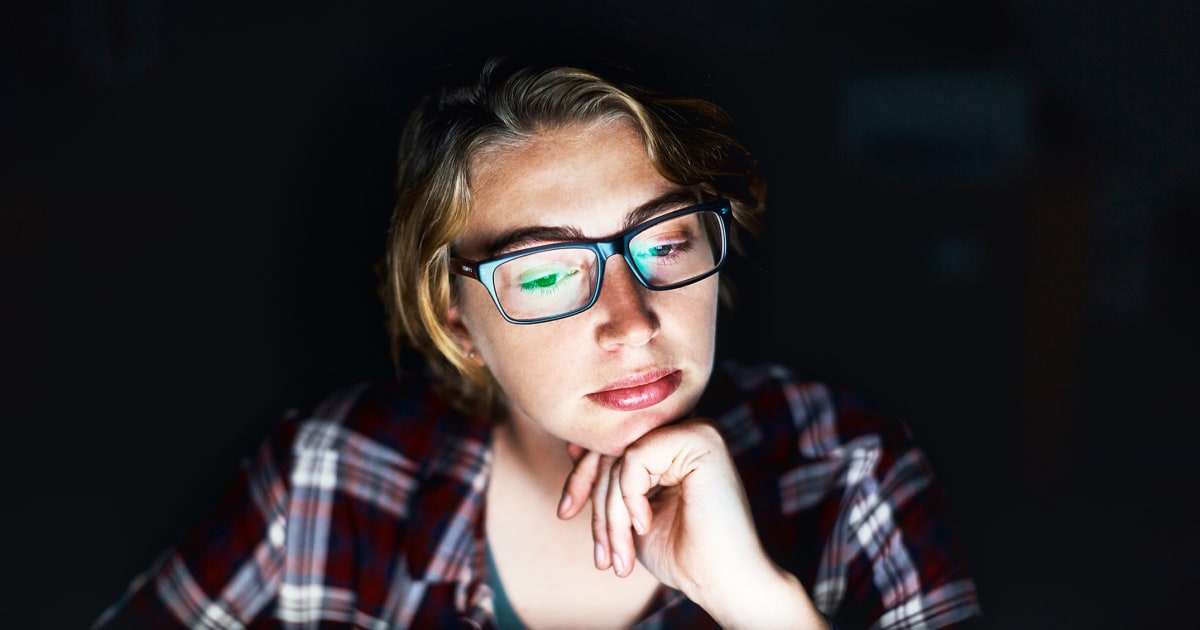
Despite their popularity, blue light-blocking glasses probably don’t do much to reduce eyestrain, help keep people alert or improve sleep, according to a meta-analysis looking at 17 studies published Thursday.
The glasses, which sellers claim protect the eyes from potentially harmful blue light coming from screens, first hit the scene in the early 2000s. Search interest skyrocketed in the first year of the pandemic.
“There is still further research that needs to be done, but based on what we have, there is likely no advantage to using those glasses to reduce digital eyestrain,” said lead author Laura Downie, an associate professor in optometry and vision sciences at the University of Melbourne in Australia.
All visible light has a unique wavelength, and the shorter the wavelength, the more energy that light is considered to have.
Blue light has a shorter wavelength than other visible light, such as red or green light. That is why some experts are concerned that, over time, blue light may damage the eye, particularly the retina, which sends signals to the brain that convert the light that hits the eye into the images people see. But whether blue light exposure actually causes retinal damage in humans remains unclear, Downie said.
She and her team reviewed 17 randomized controlled trials that investigated the effects of blue light glasses on vision, eye health and sleep quality. The results were published in the Cochrane Database of Systematic Reviews.
Blue light and eyestrain
Only three studies showed the glasses made even a slight difference in eyestrain. However, all were conducted over a short period of time and together didn’t provide good evidence that blue-light blocking glasses had much of an effect on relieving eyestrain from screens.
“There is hardly any evidence that they are effective,” said Mark Rosenfield, a professor of biological and vision sciences at SUNY College of Optometry in New York. “There may be one or two limited studies, but they are few.”
The glasses’ lackluster efficacy is most likely due to two factors: There isn’t much blue light to be blocked when it comes to computers, phones and tablets, and the glasses don’t filter out very much of it anyway.
Blue light-filtering lenses typically block only about 10% to 25% of blue light, and screens don’t emit much anyway, said Rosenfield, who wasn’t involved with the new research.
“The sun is far and away the biggest source of blue light. If we are worried about blue light, we should be worried about the sun, not screens,” he said.
Smartphone, tablet and computer screens emit only 0.4% to 4% of the amount of blue light considered safe by the International Commission on Non-Ionizing Radiation Protection, which sets international limits on artificial blue light.
Blue light isn’t likely to be why staring at such devices for extended periods of time can cause eyestrain, Rosenfield said. Instead, it’s the way people look at these screens.
“Especially with handheld devices like phones and tablets, people hold them about 12 inches away. Your eyes have to work harder to look at something that distance,” he said. “If we were looking at paper all day, that would probably still cause strain at that distance. But we’re not; we’re looking at screens.”
What about sleep?
The review also included six studies on blue light-blocking glasses and sleep. Almost all of the research conducted on the lenses’ effect on sleep has been done on specific populations that often struggle with sleep, such as pregnant women and people with certain mental health conditions.
While three studies did observe a beneficial effect on sleep, there isn’t evidence that the benefits apply to the general population. “That’s a really important point, but the research just hasn’t been done yet in the general public,” Downie said.
The idea that blocking blue light helps with sleep stems from research on the sun’s effects on the body’s biological clock. When the sun sets and the light dims, it signals to the brain that it’s time to start winding down for sleep. It’s possible that exposure to blue light from screens at night could interfere with that process, said Dr. Bhanuprakash Kolla, a psychiatrist at the Mayo Clinic in Rochester, Minnesota, who specializes in sleep medicine.
But the studies on whether blue light affects circadian rhythms have mostly been on animals rather than humans, Kolla said.
“The main takeaway right now is there is a good chance they aren’t really helpful for sleep,” he said, referring to the glasses.
Instead, what a person is looking at on a screen is likely to be the biggest factor in how screens disrupt healthy sleep.
“What they’re accessing and the stimulation that provides is much more impactful on their ability to get to sleep earlier and sleep better than the blue light,” Kolla said.
Instead of wearing blue light-blocking lenses while they scroll before bed, Kolla recommends people try adopting better sleep habits, including going to sleep around the same time every night and not having any caffeine too close to bedtime. He also recommends ditching screens while people are winding down for the night.
To reduce eyestrain, Rosenfield recommends paying attention to how close you are to screens and aiming to be about a foot and a half away to reduce eyestrain.
Downie said that for people who work on computers all day, reducing glare from lights that reflect on the screen will help reduce eyestrain. Taking frequent breaks can also help.
As for blue light-blocking lenses, Rosenfield said: “I don’t think there’s any harm, other than to your pocketbook, but I don’t think they’re doing any good, either.”
Follow NBC HEALTH on Twitter & Facebook.






